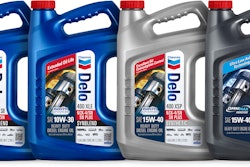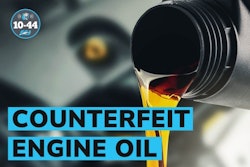Engine oils are the lifeblood of a vehicle's engine, ensuring its smooth operation, longevity and protection against wear and tear. When extreme cold temperatures arrive, the choice of engine oil becomes even more critical.
Cold weather poses significant challenges to engine oils, potentially affecting their performance and ultimately impacting the overall health of the engine. This makes choosing the right engine oil extremely important in the winter season.
What to look for in your engine oil for cold weather
Choosing the right engine oil for cold temperature performance and engine protection requires considering several key factors.
OEM engine oil recommendations. Your Original Equipment Manufacturer (OEM) should have recommended engine oil requirements listed in your owner’s manual. The specifications required (API or OEM) and viscosity should be noted. These recommendations should be followed. Usually, different viscosities for different ambient temperature ranges may be included. Most over-the-road heavy duty truck OEM’s factory-fill with a 10W-30 engine oil (API CK-4 or FA-4). 10W-30 engine oils offer better fuel economy than 15W-40 engine oils, while still offering your engine the protection it needs.
Low temperature pumpability. Pumpability refers to the ability of an engine oil to flow and circulate effectively throughout the engine's components, even in extremely cold temperatures. When the temperature drops, conventional oils tend to become thicker and less fluid, making it challenging for them to move quickly through the engine's intricate network of passages and provide lubrication to critical parts. This can lead to issues such as delayed lubrication, increased friction, and difficulty in starting the engine. The lower the winter-grade (W) portion of the engine oil viscosity (10W-30), the better it cranks and pumps in cold weather. Once again, refer to your owner’s manual for the proper viscosity grade for different ambient temperature ranges.
 Cold box testing at -22°F (-30°C) of used oil demonstrates the superior flow characteristics of CITGO CITGARD 1000 Full Synthetic 5W-40 versus a conventional 15W-40.
Cold box testing at -22°F (-30°C) of used oil demonstrates the superior flow characteristics of CITGO CITGARD 1000 Full Synthetic 5W-40 versus a conventional 15W-40.
Synthetic formulation. Synthetic oils are known for their superior cold temperature performance. They have a more consistent molecular structure, which allows them to flow better in cold weather compared to conventional oils.
Cold temperatures impacts on engine oils
Cold temperatures can have a profound impact on the viscosity of engine oils. As temperatures drop, the oil's viscosity increases, causing it to become thicker and more resistant to flowing smoothly throughout the engine's various components. Low Winter grade engine oils will flow better at cold temperatures than higher Winter grade engine oils. For example, a 5W-XX engine oil is tested for cold temperature pumpability at -35C, while a 15W-XX is tested for cold temperature pumpability at -25C.
Consequences of choosing the wrong engine oil in cold environments
Selecting the wrong engine oil for cold temperatures can have detrimental consequences. Using an oil that is not formulated for cold weather can lead to several issues, including:
• Difficulty starting. Cold Thickened oils can make it harder for the engine to turn over in cold weather, leading to prolonged cranking times and potential strain on the battery and starter motor.
• Reduced fuel efficiency: Thickened oils can create more resistance within the engine, requiring more energy to overcome, and ultimately resulting in decreased fuel efficiency.
• Poor lubrication. Inadequate lubrication due to the wrong viscosity can cause dry starts since the oil may be too thick to be pumped through the filter or the oil gallery.
• Increased wear and tear: When the engine is not adequately lubricated, the increased friction can lead to accelerated wear and tear on critical components like bearings, pistons, and cylinders.
Making the right choice
When it comes to selecting the right engine oil for cold temperature performance and engine protection, making an informed choice is paramount. Extreme cold temperatures can compromise an engine's functionality, and using the wrong oil exacerbates these challenges. Investing in a high-quality engine oil with the right viscosity/flow properties and formulation is essential to ensure proper lubrication, smooth start-ups, reduced wear and tear, and overall optimal engine performance even in the harshest winter conditions. Regularly consulting your vehicle's owner's manual and seeking the guidance of automotive lubrication experts can help you make the right choice and keep your engine running smoothly all year round.












